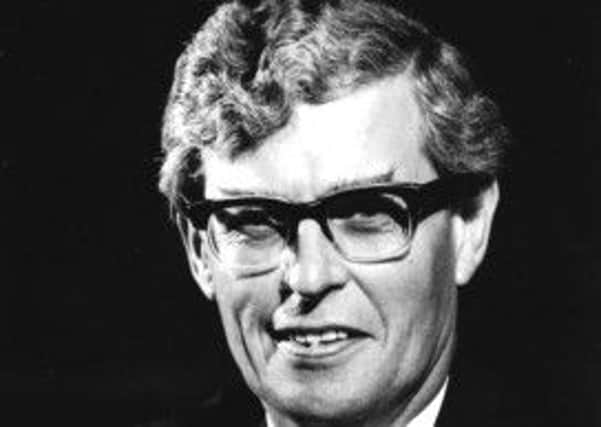Obituary: Sir Alec Stirling, KBE, CMG, diplomat


Sir Alexander Stirling – always known by family, friends and colleagues as “Alec” – was a most distinguished diplomat who served in several posts in the Middle East that required the utmost tact and diplomacy.
Throughout his career Stirling displayed such qualities with a quiet discretion and unremitting courtesy. He had a comprehensive knowledge of Arab affairs and was respected throughout the region, serving as ambassador to four Middle Eastern countries. In 1980 he survived an assassination attempt in Baghdad which made headlines throughout the world.
Advertisement
Hide AdAdvertisement
Hide AdHis time as ambassador in Baghdad was a period of abject turmoil in Iraq. Saddam Hussein was beginning to wield autocratic power and the military and the police held an iron control over the country.
On 19 June, 1980 three terrorists armed with automatic weapons and grenades burst into the forecourt of the embassy and set off bombs. They fired bullets indiscriminately and Stirling escaped being killed by inches when one of three bullets aimed at him passed across his chest and through the lapel of his jacket. With impeccable calm and diplomatic sang-froid Stirling, lying bleeding, somehow was able to dictate two urgent telegrams to London. He mentioned the serious nature of the siege and the political repercussions it might cause. He omitted to mention his own injuries.
The Foreign Office asked for the jacket with the bullet holes to be sent to London for display inside the FO. His wife, however, had already sent it to the invisible menders.
Alexander John Dickson Stirling was the son of Brigadier A Dickson Stirling, DSO, of the Royal Army Medical Corps. He attended the Edinburgh Academy from 1936 – 1945 where he distinguished himself academically, winning prizes in both French and History. After service as an RAF officer in Egypt he read Modern Languages at Lincoln College, Oxford.
He joined the Foreign Office in 1951 and studied Arabic at the Middle East Centre for Arabic Studies in Lebanon. Postings to the embassies in Beirut, Cairo, Baghdad and Amman followed.
In 1969, Sir Alec was appointed Political Agent in Bahrain and built up an excellent relationship with the Sheikh. In 1971, Stirling was appointed Britain’s first ambassador to the newly independent state. That was followed by postings in Beirut and the Lebanon where Stirling’s tact, resolve and understanding of local affairs proved invaluable.
After three years at the Royal College of Defence, Stirling was appointed in 1977 as ambassador to Iraq. The country was politically unstable but oil rich. The UK had long-standing diplomatic and commercial contacts with Iraq and it was a vital outlet for UK business.
The year after he arrived in Baghdad a former Iraqi prime minister had been shot in London so there was already an air of distrust and tension. The British Foreign Secretary, David Owen, had expelled six members of the Iraqi Embassy and in retaliation six members of the British Embassy in Baghdad were sent home.
Advertisement
Hide AdAdvertisement
Hide AdThe attack on the embassy in 1980 made the situation worse – coming on the eve of Iraq’s first national assembly elections in 20 years. Some observers considered it an attempt to disrupt the ballot. Others thought it revenge by dissidents for the deaths after the SAS raid on the Iranian embassy in London the previous month.
The result was that diplomatic relations between the UK and Iraq froze and Stirling’s attempts to retain a meaningful understanding proved difficult. Privately, Stirling described Saddam as the most evil man he had ever met.
After Baghdad, Stirling moved to Tunis where he had to deal with Yasser Arafat of the Palestine Liberation Organisation (PLO). Arafat had moved his headquarters to Tunis after fleeing from Lebanon. But Stirling’s attempts to initiate talks with the PLO and Israel proved fruitless so he put in a request to be transferred to Khartoum. It was his last diplomatic posting and one which he much enjoyed. He immersed himself in the country’s traditions and travelled widely.
Stirling’s two years in Sudan involved him in extensive aid work for the Ethiopian and Chad famines of 1985. He made it possible for the convoys delivering food and medical equipment to get through customs speedily to the refugees.
Stirling was recognised as a man of high integrity and fairness. He gained the confidence of the Arab community in all his postings and, with his fluency in their language, made invaluable friends throughout the region. His agile mind made him grasp the most complex diplomatic incident and interpret its relevance cogently and in a balanced manner.
Stirling retired in 1987 and devoted much of his time to working on behalf of animal charities. He was appointed CMG in 1976 and KBE in 1984. He married, in 1955, Alison Campbell: she and their two sons and two daughters survive him.